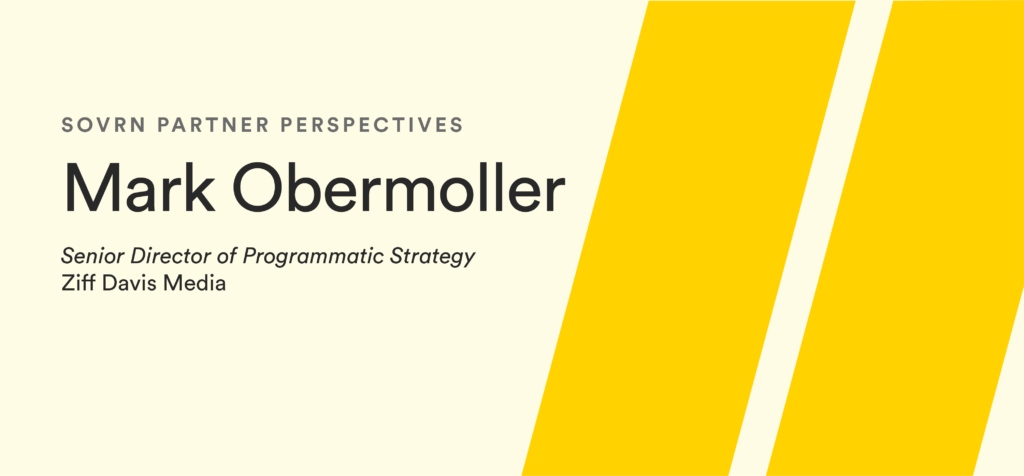Earlier this year, Sovrn announced the creation of a new steering committee, composed of leading publishers like News Corp, Warner Bros. Discovery, Publishers Clearing House, and more.
Their mission: to collaboratively tackle the biggest challenges facing publishers today and help us deliver the products publishers truly need from their ad tech partners.

With access to some of the best minds in the business, we wanted to tap into their valuable expertise and share those insights with our audience. We recently sat down with Mark Obermoller, Senior Director of Programmatic Strategy at Ziff Davis Media, to get his thoughts on the state of the digital advertising industry and his experience with Sovrn’s publisher steering committee.
Q: In your role with Ziff Davis, what are your top priorities and where are you planning to focus your energy over the next 12-18 months?
A: There are three primary things we’re focused on right now. First, we’re trying to keep things as simple as possible, while also ensuring we have a robust programmatic offering for both third-party partners and our direct sales. It’s a difficult balance to strike, especially with all the privacy-related changes in the industry. There are a lot of “shiny objects” out there right now, and it’s not always easy to know which will help to bolster our offering and which to ignore — at least for now. It’s a broad objective and not terribly glamorous, but it’s a key initiative for us.
We’re also working on better ways to identify our audiences. We have a robust first-party data strategy, but we know that’s not enough to sustain us. So how do we supplement our first-party data in a way that will help us succeed in a world without third-party cookies? There are tons of providers out there offering data and identity solutions, but what differentiates them? Even with the biggest players in the industry, there’s not much data to prove their solutions will help us succeed.
And we’re focused on video. We’re not a video-first company, so we’re looking for new and better ways to leverage the video we do have as a tool to capture user attention and keep them engaged. We want our sites to be a resource where people come back again and again.
Q: From your perspective, what are the three biggest challenges facing publishers today?
A: Honestly, the biggest challenge is uncertainty — around privacy, the way advertisers are spending their money, and in the overall economy, which directly impacts ad budgets and ad spend. When brands need to tighten their budgets, advertising is often the first thing to be cut.
Another big hurdle is inconsistency in privacy regulations. Nothing is standard — regulations are different across the country and around the world. And they’re always changing. So a lot of companies are looking for a long-term solution to stay ahead of all those privacy regulations. Which of the many cookie replacements are going to survive, and which ones will become obsolete? That’s a hard one to answer.
Third, it’s a real issue that so much ad spend goes to the huge companies like Google, Facebook, Amazon, and (to a lesser degree) Twitter/X. These so-called “walled gardens” are becoming a monopoly, and smaller publishers are left scrambling for whatever ad dollars are left. But at the same time, we’re all reliant on those big companies. We’d love to work directly with advertisers, but it’s all a matter of scale.
Q: What should publishers be doing right now to meet those challenges?
A: On the privacy side, I think the best thing we can do is try to steer the conversation. Some organizations I’m involved with have really stepped up and met with lawmakers in Washington. Getting involved and making your voice heard is the first step. If you’re complacent, nothing is going to change.
It’s also important to find ways to help advertisers reduce their reliance on walled gardens. In the past few years, we’ve seen a lot of acquisitions in the publishing industry, and a lot of companies merging. I think we’re going to see a lot more of that. If you have that larger scale, you have more leverage to go directly to advertisers and attract their ad spend — whereas small-scale, independent publishers just can’t do that.
Q: Where do you see the industry heading over the next few years?
A: I see the industry heading toward more 1:1 relationships, largely due to the death of cookies. Buyers will have to change the way they’ve always done things. Not long ago, the end of third-party cookies wasn’t even a conversation for marketers and advertisers, who use them every day. Publishers and tech companies were the ones trying to come up with a solution. Now everyone knows change is coming — it’s just a matter of what things look like when the dust settles.
Today, the majority of ad spend is happening on Chrome, where cookies are still available. When those cookies are gone, advertisers will still need a way to reach their audience and target specific segments effectively. The big walled gardens won’t have that information anymore, and they can’t get it from an outside source. Instead, advertisers will have to go to publishers, who know their audience and can provide access to those audience segments. So having a robust first-party data strategy will position publishers for success.
Q: What made you want to join Sovrn’s publisher steering committee?
A: When Sovrn’s Peter Cunha described his vision for the steering committee, he said, “I don’t care if you use the product or not; I want input from people who are at the forefront of the industry.” That was really attractive to me, because it’s an opportunity to help deliver a first-rate product for other publishers who may not have the same resources I do. I’ve worked for organizations that have excellent engineering and tech teams, but we were always constrained by time. Helping to put out a product that’s low maintenance and easy to set up is a real win.
Q: What’s been your experience so far with the steering committee, and how would you like to see it evolve over time?
A: In some initial conversations with the Sovrn team, I was able to react to what they were doing with the product and point out where it was still very labor intensive for publishers. They’ve taken that feedback and used it to make the product better. Five years ago, if I’d had some of the things they’re developing today, it would have saved me a tremendous amount of time and energy. Seeing those advances come to fruition is really rewarding.
Q: Why do you think groups like this are important, especially in the current market environment?
A: A lot of publishers feel like they’re on their own, and that’s just not the case. Committees like this provide ways to come together, share ideas, and reach out for additional resources. I think this group is important because we’re helping to drive the market forward and shape the future — rather than just reacting.
For more insights to help you grow your business on the open web, visit the Sovrn blog. You can also contact us at sales@sovrn.com for more information about our comprehensive suite of publisher solutions for advertising, commerce, and data.

